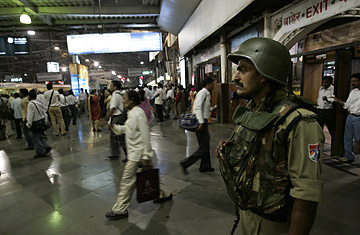
A police officer stands guard in Chhatrapati Shivaji Terminus train station, Mumbai, as rumours of further terrorist attacks circulate.
(2 of 2)
New Delhi has already sent Islamabad a list of some 20 terrorist suspects currently thought to be hiding in Pakistan, including the notorious don of Mumbai's underworld, Dawood Ibrahim, as well as the chiefs of anti-Indian extremist groups Jaish-e-Mohamed (JeM) and Lashkar-e-Toiba (LeT). Pakistan has yet to accede to these demands, though it has called for the formation of a joint investigative arm to ferret out terrorists who plague both nations. U.S. Secretary of State Condoleezza Rice is due to land in New Delhi on Wednesday in a show of support for India's fight against terrorism. "What we are emphasizing to the Pakistani government," she told reporters in London on Monday, "is the need to follow the evidence wherever it leads."
The evidence may lead to a sticky situation for the U.S., which is desperately trying to focus Pakistan's government on combating resurgent militants along its inflamed border with Afghanistan. In the run-up to his presidential campaign, President-elect Barack Obama claimed he would be willing to unilaterally launch targeted strikes against terrorist camps operating within Pakistani territory — a lesson not lost on Indians eyeing the bases of groups like LeT, which allegedly trained the Mumbai attackers. "There has been an international legitimization of such a strike in Pakistan," says Dipankar Banerjee, director of the Delhi-based Institute for Peace and Conflict Studies. While few think India will take such provocative action, the ruling Congress Party is facing intense domestic pressure from opposition parties that, as elections loom, have labeled Singh's administration as soft on terrorism. "The Congress Party has to be seen as strong. The country's asking for it," says Banerjee.
To assist India, the U.S. must play a pivotal role, suggests defense analyst C. Uday Bhaskar, in ushering in a political environment in Pakistan that does not give space to anti-Indian terrorism. This begins with a final reckoning within the Pakistani military and its notorious intelligence services. "The U.S. has over a 40-year relationship with Pakistan's army," says Bhaskar. "[Secretary of State] Rice ought to say, 'Guys, the script has changed.'"
The much more daunting challenge facing India's leaders, though, is one that cannot be solved by pointing fingers. The audacity of the strike against Mumbai's ritziest neighborhood and the carnage that ensued have exposed troubling holes not only in India's security apparatus but also in whole realms of domestic governance, from its leaky immigration policy to how municipalities are funded to how its minorities are treated. That requires the sort of earnest, thankless hard work few governments can muster, especially while campaigning for elections. Meanwhile, India's public is fuming. "Today," says hotelier Ahmed almost shaking with rage, "we must put an end to this nonsense once and for all."
—With reporting by Madhur Singh/Mumbai and Jyoti Thottam/New Delhi
